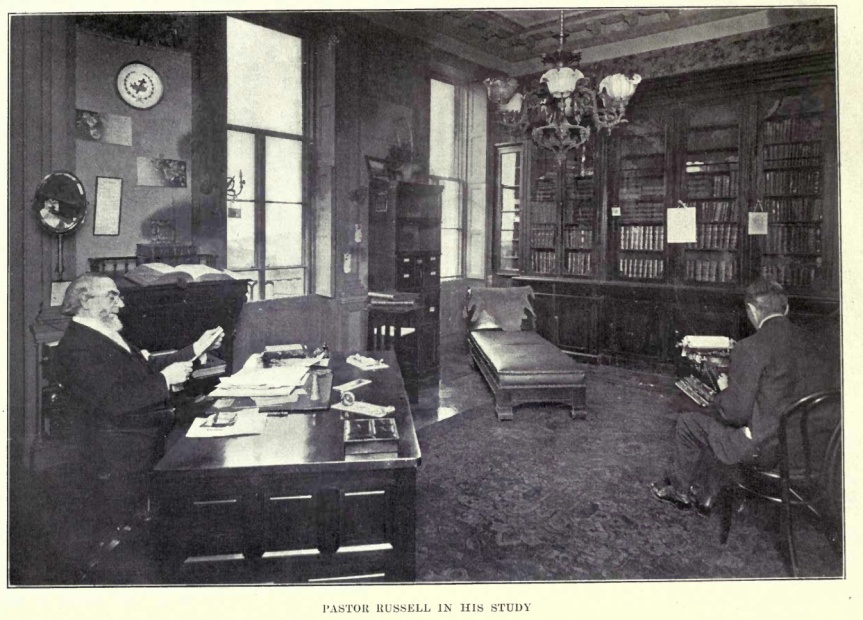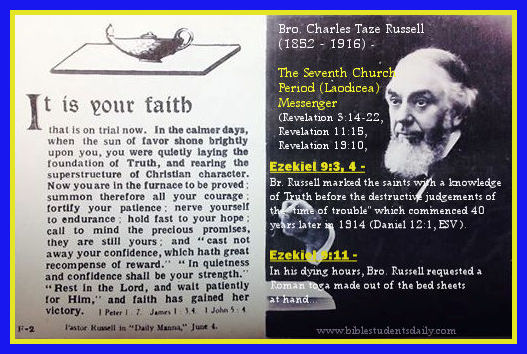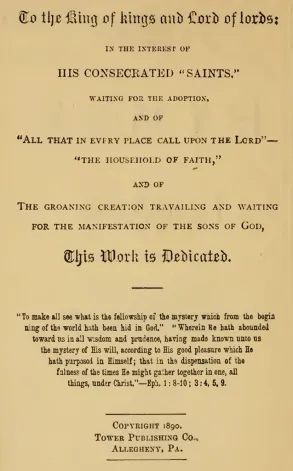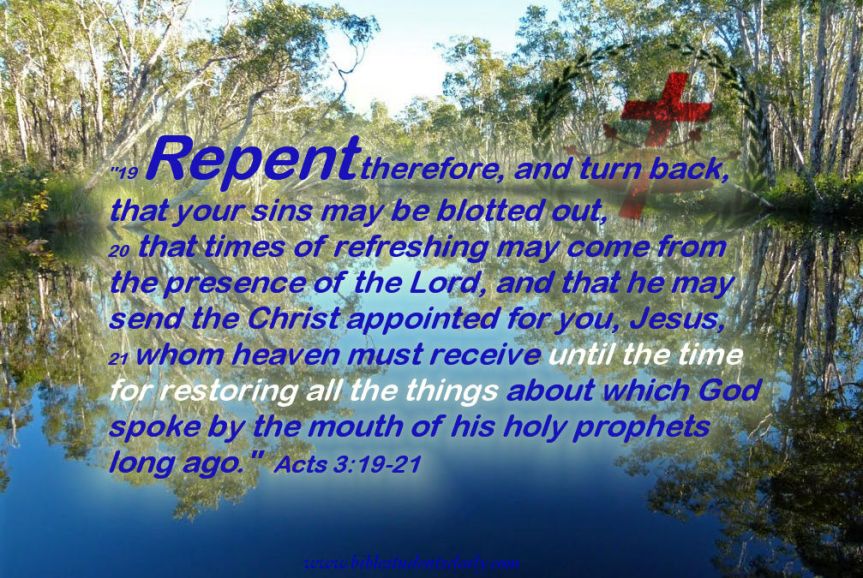Awake My Soul – Hymns of Dawn No. 20
Here is a recording of Hymn No. 20 from the “Hymns of Dawn” to aid God’s people in singing and making melody in their hearts unto God.
“(1) Come, let us shout joyfully to Jehovah! Let us shout in triumph to our Rock of salvation. (2) Let us come into his presence with thanksgiving; Let us sing and shout in triumph to him” (Psalm 95:1, 2).
“My mouth shall praise Thee with joyful lips” (Psalm 63:5).
Lyrics
1.
Awake, my soul, stretch ev’ry nerve,
And press with vigor on;
A heav’nly race demands thy zeal,
And an immortal crown,
And an immortal crown.
2.
A cloud of witnesses around
Hold thee in full survey;
Forget the steps already trod,
And onward urge thy way,
And onward urge thy way.
3.
‘Tis God’s all animating voice
That calls thee from on high;
‘Tis his own hand presents the prize
To thine aspiring eye,
To thine aspiring eye.
4.
That prize with peerless glory bright,
With thee, O Lord, we’ll gain,
When earth’s great monarchs shall have lost
Their glory and their fame,
Their glory and their fame.
5.
Blest Saviour, introduced by thee,
Our race have we begun;
And crowned with vict’ry, at thy feet
We’ll lay our trophies down,
We’ll lay our trophies down.
*******
The History Of This Hymn
Author — Philip Doddridge (1702-1751)
Composer — George Frideric Handel (1685-1759). This Hymn’s tune was written by Handel in 1728 and titled “Christmas.”
*******
Bible Scriptures Associated With This Hymn
James 1:12 (NIV) — “Blessed is a man who perseveres under trial; for once he has been approved, he will receive the crown of life which the Lord has promised to those who love Him.”
Revelation 2:10 (NAS) — “Be faithful until death, and I will give you the crown of life.”
Revelation 3:11, 21 (ESV) — “(3) I am coming soon. Hold fast what you have, so that no one may seize your crown... (21) The one who conquers, I will grant him to sit with me on my throne, as I also conquered and sat down with my Father on his throne.”
Isaiah 62:3 (NAS) — “You will also be a crown of beauty in the hand of the LORD, And a royal diadem in the hand of your God.”
Philippians 3:14 (NIV) — “I press on toward the goal to win the prize for which God has called me heavenward in Christ Jesus.”
Hebrews 10:36 (NAS) — “For you have need of endurance, so that when you have done the will of God, you may receive what was promised.”
Hebrews 12:1-2 (NAS) — “(1) Therefore, since we have so great a cloud of witnesses surrounding us, let us also lay aside every encumbrance and the sin which so easily entangles us, and let us run with endurance the race that is set before us, (2) fixing our eyes on Jesus, the author and perfector of faith, who for the joy set before Him endured the cross, despising the shame, and has sat down at the right hand of the throne of God.”
2 Timothy 4:7-8 (ESV) — “(7) I have fought the good fight, I have finished the race, I have kept the faith. (8) Henceforth there is laid up for me the crown of righteousness, which the Lord, the righteous judge, will award to me on that day, and not only to me but also to all who have loved his appearing.
*******
The words below are from Reprint No. 5499, from the Original Watchtower and Herald of Christ’s Presence.
THE PURPOSE OF OUR TRIALS
“Blessed is the man that endureth temptation; for when he is tried, he shall receive the crown of life, which the Lord hath promised to them that love Him.” — James 1:12.
THE WORD blessed in this text may be understood to signify the condition of one in the favor of God. The state of such will be a happy one, a desirable one. The word blessed does not, of course, always suggest a happy condition as relates to the feelings, or emotions, but rather as relates to the outcome. It is used here in connection with the results of trial to the Christian. The child of God who wins the crown of life will be very highly favored or blessed of God; then whatever conduces to this end is a very great blessing, even though it cause much pain to the flesh.
Who will gain this crown of life? Of what character will he be? The Scriptures declare that it will be that man or that woman who endures temptation, trial. What is signified by enduring temptation? Evidently the thought is not the enduring of one temptation for one time or for many times. Even the world must endure trials. The reference is to the retaining permanently of the attitude of patient endurance and faithfulness when tempted, of remaining true to God under temptation and stress. Temptations come from a variety of sources. They may come from friends, who may tempt us to live a life of more or less self-indulgence, to relax in a measure our fidelity to the Lord. The enticements of wealth or worldly society, a natural love of ease and disinclination of the flesh to endure hardness—any or all of these may prove strong and subtle temptations to the Christian.
But if we love the Lord supremely, that love will become the chief impulse of our lives. Our one aim will be that we may glorify God in our spirit and in our body. We know that there are things which are displeasing to God, and if we love Him we will seek to keep His commandments. The child of God might fail once, or he might fail repeatedly along the same line, until in deep humiliation and anguish of soul because of his continued manifestation of the same weakness, he would be led to cry out with strong crying and tears to the Lord; and his pain and distress of heart might so impress upon him his need of greater watchfulness along that line that he would become strengthened for further attacks of the same nature, and thus be enabled to gain the victory over his besetment, his special weakness.
THE CROWN OF RIGHTEOUSNESS
While we shall never reach the point of perfection in the flesh, nevertheless this power to endure temptation should become more marked day by day, as the New Creature remains loyal, still resisting and striving still harder to resist and be true to the Lord in thought and word and deed. Blessed is the man who shall endure—time after time, day after day—thus proving his faithfulness and obedience to God. For when that man is tried, when the trial time is over, when God has seen that he has demonstrated fully his loyalty, then, when God’s “due time” has come, that tried and proven one shall receive the crown of life.
The expression, “the crown of life,” is another way of saying the reward of life; and this life is on the highest plane. The Apostle Paul speaks of this same crown as the “crown of righteousness.” The Apostle Peter calls it the “crown of glory.” It is the crown of righteousness because it is the reward that comes as the result of righteousness, of obedience to God and the principles of His Government, of faithfulness to our covenant. It is the crown of glory because it is the reward which brings glory, honor, immortality.
In the Grecian games certain rewards were given to those who endured successfully the trial of their skill, of their prowess and of their physical endurance. The reward given was usually a crown or wreath of laurel. That crown was valuable, not so much in itself, but especially as an outward token of appreciation of superior merit. The fact that it was evergreen would suggest to the Christian that our reward as “overcomers” will be a lasting reward, an eternal reward.
The Lord is to give us life in fullest measure. The penalty that came upon our race because of sin was death; but now there is an opportunity to regain life—life in perfection, untainted, unending. This life is in the Son of God. At the present time life can be gained only by being begotten to the spirit nature. The crown of life, to be given to the “more than conquerors,” is a very special kind of life—immortality, the highest form of life possible, the crown, or pinnacle, of all life. This is to be the reward of the class called in Scripture the Bride of Christ, when they shall have demonstrated their faithfulness, when they shall have been proven worthy to be members of that exalted class.
There will be a crown of life in the next Age—perfect human life—as the result of obedience to the tests and trials of that time. These tests will differ in many respects from the trials and difficulties of the Church at the present time. They will be much less crucial; for then temptations to sin from without will be removed, and bodily and mental uplifting and assistance granted, which will make their trial a more favorable one. Righteousness, too, will immediately be rewarded in that Day, and sin and disobedience of every kind will be promptly punished. But now righteousness often brings suffering, reproach, pain and loss, from the human standpoint; while sin often brings present advantage, popularity and pleasure to the flesh.
THE PROPER VIEW OF OUR TRIALS
There is a special love required by God of the Gospel Church—this peculiar class now called of Him. They are to have a love that is so unselfish that it will be willing, yea, glad, to lay down the earthly life in the service of God, that they may bring blessings to others. To these God has promised the special crown of life—immortality, His own nature. These are to be the blessers of their brethren, those of the nature formerly their own. As Isaac was the blesser of Ishmael and of the sons of Keturah, and as the first-born of Israel were the blessers of their brethren, so these will bless all the peoples of the earth, from among whom they were chosen. How thankful we should be for an honor so great!
If these favored children of the Heavenly King could always keep in mind the fact that every trial and testing, every persecution and difficulty, permitted to come upon those who have made the Covenant of Sacrifice with the Lord, is designed to develop them, to prove and test their love, to demonstrate whether or not their characters are fixed, rooted and grounded in righteousness, it would set all their painful experiences and temptations in a new light, and would be a great assistance to them in fighting the good fight of faith successfully. For if by these trials and tribulations the Lord is proving our love and devotion to Him, then whatever they may be, whether great or small, we should diligently use them as opportunities to demonstrate to our God the fulness of our love for Him and His cause, and as means by which we may rise day by day to greater heights of spiritual attainment, being changed into the likeness of our Master.
Thus viewed and thus met, every trial and affliction would prove a blessing, a Heavenly messenger, bearing us on wings of faith “Nearer, our God, to Thee, nearer to Thee.” Then, beloved, “count it all joy when ye fall into divers temptations [trials, testings], knowing this, that the trial of your faith worketh patience [patient endurance]. But let patience perfect her work, that ye may be perfect and entire, wanting nothing.” Herein we “greatly rejoice—though now for a season, if need be, ye are in heaviness through manifold temptations [testings, provings], that the trial of your faith, being much more precious than of gold, which perisheth, might be found unto praise and honor and glory at the appearing of Jesus Christ, whom having not seen, ye love; in whom, though now ye see Him not, yet believing, ye rejoice with joy unspeakable and full of glory, receiving the end of your faith, even the salvation of your souls!”—James 1:2-4; 1 Peter 1:6-8.
Truly, “these light afflictions, which are but for a moment, work out for us a far more exceeding and eternal weight of glory, while we look not at the things which are seen, but at the things which are not seen; for the things that are seen [the things of the present order] are temporal, but the things which are not seen [the glories to come] are eternal.”—2 Corinthians 4:17,18.
“WILL YE ALSO GO AWAY?”
Thus we are assured in the infallible Word of God that those who love the Lord, and who are to receive the Kingdom, will have their love tested by trials and temptations on the way to that Kingdom. Those who do not [R5500 : page 215] love the Lord with all their hearts, in whom self or some other idol has first place, will be seduced by the world, the flesh or the Devil into some form of rebellion against the Divine Word or the Divine providences. They will have schemes and theories which they will prefer to the Lord’s Plan and the Lord’s way; and their schemes when analyzed will usually be found to be based either upon selfishness or ambition or upon an evil spirit of envy, hatred, jealousy, etc.
The Lord’s leading and the Lord’s words lose their attraction to such, and they lose their interest correspondingly; and like those who turned away from the Master at His First Advent, and said, “This is a hard saying,” so these also go away and “walk no more with Him.” But some will continue to walk with the Lord; some will not be driven away nor decoyed from Him by the arts and wiles of the Evil One and his hosts. These are such as are at heart fully the Lord’s, not their own; they will follow the Lamb of God, whithersoever He may lead, because they have no will except His will. They will follow Him through all the Narrow Way of discipline and trial in this life; and by and by, as He has assured them, “They shall walk with Me in white; for they are worthy.”—Revelation 3:4.
OUR UNFAILING SHELTER
Nor will this choice company lack in number by reason of the falling away of some. It will be of the predestinated number which God arranged to constitute the Bride, the Lamb’s Wife. The Father’s foreknowledge made full allowance for all who would turn back, and He knew that the requisite number would follow on, to make their calling and election sure. These have learned that the call of the world, the promptings of the flesh, and the arts of the Adversary, are all snares and traps and pitfalls to drag them down to death.
They have learned the sound of the true Shepherd’s voice, and cannot be enticed by the voice of strangers.
Precious children of the Lord, blessed are ye! Sheltered in the “secret place of the Most High” no evil shall befall thee, neither shall any plague come nigh thy dwelling. “He shall give His angels charge concerning thee; they shall bear thee up in their hands, lest thou dash thy foot against a stone.” How safe and secure are these! Though a thousand fall at their side, and ten thousand at their right hand, yet the plague shall not come nigh them. They have “made the Most High their Habitation,” and He will keep them from all harm.
“Under His Wings I am safely abiding,
Though the night deepens and tempests are wild;
Still I can trust Him, I know He will keep me;
He has redeemed me, and I am His child.
“Under His Wings! What a refuge in sorrow!
How the heart yearningly turns to His rest!
Often when earth has no balm for my healing,
Here I find comfort, and here I am blest.
“Under His Wings! Oh, what precious enfolding!
Here will I hide till life’s trials are o’er;
Sheltered, protected, no evil can harm me,
Resting in Jesus, I’m safe evermore!”
As the faithful disciples of the Master in the first Harvest realized a meaning in His teachings which others of the professed children of God could not appreciate, so now, at the Second Advent of the Lord, His words have a precious significance to those who are in heart-harmony with Him which none others can realize. And we see now, as at the First Advent, that some are stumbling and going back, while others are being drawn more closely to the Lord than ever, by means of the knowledge of His Plan which He is supplying.
FEASTING IN THE BANQUET HALL
As we draw nearer to the close of the Harvest, we shall not be surprised if the way become still narrower, still more difficult, and if the temptations to stumble and to fall become still more frequent.
Let us then, dear brethren, be more and more on our guard against the wiles of the great Enemy of our souls, and against the deceptions of our own fallen nature. Let the perfect love of God rule in your hearts, driving out self-love and world-love, with their pride, ambition and folly. Let entire devotion to God bring into your hearts the promised fulness of joy and rest and peace.
Be fruitful branches in the Vine, abiding ever in Him, responding to all the prunings of the great Husbandman with more abundant fruitage.
If beguilements come to us, let us say with the Apostles of old: “Lord, to whom shall we go? Thou hast the words of eternal life.” There is life nowhere else, and we wish to go nowhere else. We are feasting in the banquet hall of our Father’s House, “and His banner over us is love!” We have an abundant supply: our table is richly laden. So we eat and go on our way rejoicing. We are nearing Home. We shall soon reach the last mile-stone in our journey! Then, with a song on our lips, let us press on!
“Tempted and tried, whatever betide,
In His secret pavilion His children shall hide.
‘Neath the shadowing wing of eternity’s King,
His children may trust, yea, His children may sing.
“Tempted and tried, yet the Lord will abide
Thy faithful Redeemer and Keeper and Guide,
Thy shield and thy sword, thine exceeding reward;
Then enough for the servant to be as his Lord.
“Tempted and tried, the Savior who died
Hath called thee to suffer—then reign by His side.
If His cross thou wilt bear, His crown thou shalt wear,
And forever and ever His glory shalt share.”
*******
Hymn Book Purchase
The Hymns Of Dawn (hymn book) can be purchased at:
- The Chicago Bible Students Online Bookstore: https://chicagobible.org/product-category/books/page/4/
- The Dawn Bible Students Association: http://www.dawnbible.com/dawnpub.htm
Acknowledgment & References
- Br. Charles Taze Russell

Br. Charles Russell—the founder of the Bible Students movement, who is the compiler of “Poems and Hymns of Millennial Dawn” which was published in Allegheny, Pa., in 1890. This Bible Students’ devotional originally contained a total of 151 poems and 333 hymns.
The following prefatory to the 1905 publication of Hymns of Millennial Dawn may be of historical interest to many of our readers.
We published in 1890, with several more recent editions, a volume entitled “Poems and Hymns of Millennial Dawn” without music. The same collection of hymns with the music is now urgently needed, and therefore appears in this volume. The poems, although highly prized, are omitted for greater convenience in size. We have preserved the same alphabetical order, because so many of our readers have the older book; and where a different tune is given from that originally suggested the latter is indicated by Alt. for alternative tune, with the number where that tune can be found.
Both words and music are credited to the same class to whom the work is dedicated—to the Lord and His faithful people, “the Saints.” The authors of many of the best of them are unknown to us, and, besides, slight changes have been made in the phraseology and sentiment of quite a number, which we could not be sure their original authors would approve, and to give personal credit to less than one half would seem invidious. To all of these dear “Saints” of all ages we therefore give united and hearty thanks for the blessings which they, as the Lord’s servants and handmaidens, have bestowed upon their fellow-members of “the Church of the Firstborn, whose names are written in Heaven.” Most of them died long ago: their abundant reward will be of the Lord in the resurrection.
That the collection is thoroughly undenominational, unsectarian, will be manifest to those recognizing the fact that it includes the choicest old hymns and tunes used by all denominations.
Although we have gathered far and near and winnowed carefully we cannot hope to have gotten all the golden grains, though we do hope that no chaff can be found. The collection is for the Church, for “believers” “reconciled,” and hence contains none of the “sinners” hymns, such as “Come, ye sinners poor and needy,” because willful sinners are in no sense members of the “Body” of Christ, nor are those who have not yet accepted the Lord as their Savior.
Those who will feel the deepest interest in this collection, and whose sentiments will be most fully voiced in its verses, will undoubtedly be those in fullest degree of sympathy with the divine plan of the ages, as set forth in the several volumes of Millennial Dawn – the eyes of whose understanding have been opened to the clearer, purer light now shining from our great Redeemer’s cross, showing the fulness and the completeness of his salvation.
In fact, this volume, while not numbered as one of the volumes of the Millennial Dawn series, is designed to be a companion volume, a melodious accompaniment to the “new song,” “the song of Moses and the Lamb” (the grand harmony of the Law and the Gospel), as presented in the regular Dawn series.
Let the music of God’s good and great plan ring through your hearts and lives, dear fellow-pilgrims and fellow members of the “royal priesthood,” so that every day and every hour shall be filled with joy and praise and thankfulness! And that this little volume may assist in deepening the work of grace in your hearts is our hope and prayer.
– Watch Tower Bible and Tract Society, July, 1905, Allegheny, PA, USA
—–
Later on, the hymns from this book formed a basis for the hymnal titled “Hymns of Dawn” which was published by the Dawn Bible Students Association in East Rutherford, New Jersey (USA) and the 1999 edition contains a total of 361 hymns.
- Harvest Truth Data Base
- Hymnary.org.
Suggested Further Reading
1 THESSALONIANS 5:16-18 – Prayer – The “Oxygen” for the New Creature in Christ.
https://biblestudentsdaily.com/2017/11/04/1-thessalonians-516-18-prayer-the-oxygen-for-the-new-creature-in-christ/
Be Thou Faithful Unto Death
https://biblestudentsdaily.com/2017/08/10/be-thou-faithful-unto-death/
Our Trial
https://biblestudentsdaily.com/2016/11/10/our-trial/
Are You Able
https://biblestudentsdaily.com/2017/07/04/are-you-able/
ACTS 23:6 – HOPE & RESURRECTION. PART A. What Is Jesus All About?
https://biblestudentsdaily.com/2016/11/03/acts-236-hope-resurrection-part-a-what-is-jesus-all-about/
ACTS 23:6 – HOPE & RESURRECTION. PART B. Will Mankind Resurrect With the Same Mind?
https://biblestudentsdaily.com/2016/11/05/acts-236-hope-resurrection-part-b-will-mankind-resurrect-with-the-same-mind/
ACTS 23:6 – HOPE & RESURRECTION. PART C. The Order of the Resurrection Process. https://biblestudentsdaily.com/2016/11/11/acts-236-hope-resurrection-part-c-the-order-of-the-resurrection-process/
ACTS 3:19-21 – The Restitution of All Things
https://biblestudentsdaily.com/2017/08/02/acts-319-21-the-restitution-of-all-things/
Epoch Periods In God’s Plan
https://biblestudentsdaily.com/2017/08/16/epoch-periods-in-gods-plan/
The Resurrection of the Dead. Faithbuilders Fellowship, Nov. – Dec. 2008 (Journal Section). http://www.2043ad.com/journal/2008/06_nd_08.pdf
Life After Death. Dawn Bible Students Association.
http://www.dawnbible.com/booklets/life.htm
What Does the Word “hell” really mean?
https://biblestudentsdaily.com/2017/05/18/what-does-the-word-hell-really-mean/
The Truth About Hell booklet, the Dawn Bible Association.
When A Man Dies booklet, the Dawn Bible Association.
What Everyone Should Know About Being Saved booklet, the Chicago Bible Students.
What Say the Scriptures About Hell, The Herald of Christ’s Kingdom Magazine.

The URL of this post: https://biblestudentsdaily.com/2018/06/27/awake-my-soul-hymns-of-dawn-no-20/






